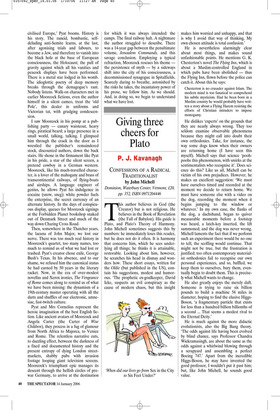Giving three cheers for Plato
P. J. Kavanagh
CONFESSIONS OF A RADICAL TRADITIONALIST by John Michell Dominion, Waterbury Center, Vermont, £20, pp. 352, ISBN 0971204446 This author believes in God (the Creator) but is not religious. He believes in the Book of Revelation (the Fall of Babylon). His guide is Plato, and Plato’s Theory of Harmony. John Michell sometimes suggests this by numbers: he immediately loses this reader, but he does not do it often. It is harmony that concerns him, which he sees underlying all things; he thinks it is attainable, restorable. Looking about him, however, he scratches his head in dismay and wonders how. These short essays, written for the Oldie (but published in the US), contain his suggestions, modest and humorous. ‘The prophetic ex-goalkeeper, David Icke, suspects an evil conspiracy as the cause of modern chaos, but this insight makes him worried and unhappy, and that is why I avoid that way of thinking. My own chosen attitude is total confusion.’ He is nevertheless alarmingly clear about most things, and makes sound unfashionable points. He mentions G. K. Chesterton’s novel The Flying Inn, which is about a Muslim-controlled England in which pubs have been abolished — thus the Flying Inn, flown before the police can catch it. About this he says:
Chesterton is no crusader against Islam. The modern mind is too fanatical to comprehend his subtle mysticism. Had he been born in a Muslim country he would probably have written a story about a Flying Harem resisting the efforts of Christian intruders to impose monogamy.
He dislikes ‘experts’ on the grounds that they are nearly always wrong. They too seldom examine observable phenomena because they might call into doubt their own orthodoxies. Take, for instance, the way some dogs know when their owners are returning home (I have seen this myself). Michell says that science ‘poohpoohs this phenomenon, with smirks at the sentimentalists who recognise it’. Does science do this? Like us all, Michell can be victim of his own prejudices. However, he makes an excellent suggestion: ‘We must have ourselves timed and recorded at the moment we decide to return home. We must have someone else with a video on the dog, recording the moment when it begins jumping to the window or whatever.’ In my own case, the flanks of the dog, a dachshund, began to quiver measurable moments before a footstep was heard, a latch-key inserted, the lift summoned; and the dog was never wrong. Michell laments the fact that if we perform such an experiment there would be no one to tell, the scoffing would continue. That might not be true, but the frustration is justified; too often contemporary materialist orthodoxies fail to recognise our own personal experiences, and so, baffled, we keep them to ourselves, bury them, eventually begin to doubt them. This is precisely what Michell wants to change.
He also greatly enjoys the merely daft. Someone is trying to raise six billion pounds to build a machine 58 miles in diameter, hoping to find the elusive HiggsBoson, ‘a fragmentary particle that exists for less than a hundred billion billionths of a second ... That seems a modest rival to the Eternal Deity.’ He is much against the more didactic evolutionists, also the Big Bang theory. ‘The odds against life having been evolved by blind chance, says Professor Chandra Wickramasingh, are about the same as the odds against a whirlwind blowing through a scrapyard and assembling a perfect Boeing 747.’ Apart from the incredible Higgs-Boson, he may have invented the good professor, I wouldn’t put it past him; but, like John Michell, he sounds good value.














































 Previous page
Previous page